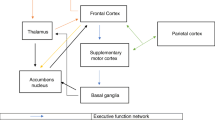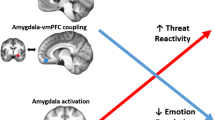Abstract
Cognitive reserve (CR) is the premorbid brain capacity to cope with neural damage. People with good CR can tolerate higher levels of pathological brain injuries before displaying clinical symptoms than others. This study aimed to analyze CR in a sample of patients diagnosed with first-episode psychosis (FEP) during childhood or adolescence, comparing them to a community control group (CC) and assessing the predictive value of CR regarding psychosocial functioning, clinical symptoms and neuropsychological variables at the 5-year follow-up. 57 patients diagnosed with FEP during childhood or adolescence and 37 controls completed clinical, neuropsychological, and psychosocial functioning assessments at baseline and 5-year follow-up. CR was assessed in both groups at baseline. The FEP group showed lower CR scores than the CC group. Higher CR in the FEP group was associated with fewer psychotic negative symptoms, total psychotic symptoms and depressive symptoms, higher psychosocial functioning, and less impaired memory and attention at the 5-year follow-up. CR is associated with long-term clinical, neuropsychological and psychosocial functioning outcomes in patients diagnosed with FEP during childhood or adolescence.
Similar content being viewed by others
References
Stern Y (2003) The concept of cognitive reserve: a catalyst for research. J Clin Exp Neuropsychol 25:589–593
Lee J, Park H, Chey J (2018) Education as a protective factor moderating the effect of depression on memory impairment in elderly women. Psychiatry Investig 15:70–77
Barnett JH, Salmond CH, Jones PB, Sahakian BJ (2006) Cognitive reserve in neuropsychiatry. Psychol Med 36:1053–1064
Cheng S-T (2016) Cognitive reserve and the prevention of dementia: the role of physical and cognitive activities. Curr Psychiatry Rep 18:85
Stern Y (2009) Cognitive reserve. Neuropsychologia 47 (10)
Stern Y (2012) Cognitive reserve in ageing and Alzheimer’s disease. Lancet Neurol 11:1006–1012
Sumowski JF (2018) “Brain reserve” and “cognitive reserve” should always be taken into account when studying neurodegeneration – YES. Mult Scler J 24:574–575
de la Serna E, Andrés-Perpiñá S, Puig O et al (2013) Cognitive reserve as a predictor of two year neuropsychological performance in early onset first-episode schizophrenia. Schizophr Res 143:125–131
Hinrichs KH, Easter RE, Angers K et al (2017) Influence of cognitive reserve on neuropsychological functioning in bipolar disorder: Findings from a 5-year longitudinal study. Bipolar Disord 19:50–59
Staff RT, Murray AD, Deary IJ, Whalley LJ (2004) What provides cerebral reserve? Brain 127:1191–1199
Vanderploeg RD, Schinka JA, Axelrod BN (1996) Estimation of WAIS—R premorbid intelligence: Current ability and demographic data used in a best-performance fashion. Psychol Assess 8:404–411
Vanderploeg RD, Schinka JA, Baum KM et al (1998) WISC-III premorbid prediction strategies: Demographic and best performance approaches. Psychol Assess 10:277–284
Anaya C, Torrent C, Caballero FF et al (2016) Cognitive reserve in bipolar disorder: relation to cognition, psychosocial functioning and quality of life. Acta Psychiatr Scand 133:386–398
Clare L, Wu Y-T, Teale JC, et al (2017) Potentially modifiable lifestyle factors, cognitive reserve, and cognitive function in later life: A cross-sectional study. PLoS Med 14:
Evans IEM, Llewellyn DJ, Matthews FE, et al (2018) Social isolation, cognitive reserve, and cognition in healthy older people. PLoS One 13:
Fancourt D, Steptoe A, Cadar D (2018) Cultural engagement and cognitive reserve: museum attendance and dementia incidence over a 10-year period. Br J Psychiatry 213:661–663
McHugh Power J, Tang J, Lawlor B et al (2018) Mediators of the relationship between social activities and cognitive function among older Irish adults: results from the Irish longitudinal study on ageing. Aging Ment Health 22:129–134
Yates LA, Ziser S, Spector A, Orrell M (2016) Cognitive leisure activities and future risk of cognitive impairment and dementia: systematic review and meta-analysis. Int Psychogeriatrics 28:1791–1806
Amoretti S, Cabrera B, Torrent C et al (2018) Cognitive reserve as an outcome predictor: first-episode affective versus non-affective psychosis. Acta Psychiatr Scand 138:441–455
Amoretti S, Bernardo M, Bonnin CM et al (2016) The impact of cognitive reserve in the outcome of first-episode psychoses: 2-year follow-up study. Eur Neuropsychopharmacol 26:1638–1648
Forcada I, Mur M, Mora E et al (2015) The influence of cognitive reserve on psychosocial and neuropsychological functioning in bipolar disorder. Eur Neuropsychopharmacol 25:214–222
Grande I, Sanchez-Moreno J, Sole B et al (2017) High cognitive reserve in bipolar disorders as a moderator of neurocognitive impairment. J Affect Disord 208:621–627
Pastò L, Portaccio E, Goretti B et al (2016) The cognitive reserve theory in the setting of pediatric-onset multiple sclerosis. Mult Scler 22:1741–1749
American Psychiatric Association. (1994) Diagnostic and statistical manual of mental disorders: DSM-IV. Washington, SC
Kaufman J, Birmaher B, Brent D et al (1997) Schedule for affective disorders and schizophrenia for school-age children-present and lifetime version (K-SADS-PL): Initial reliability and validity data. J Am Acad Child Adolesc Psychiatry 36:980–988
First M, Spitzer R, Gibbon M, Williams J (1997) User’s guide for the Structured clinical interview for DSM-IV axis I disorders SCID-I: clinician version
Hollingshead AB, Redlich FC (2007) Social class and mental illness: A community study. Am J Public Health 97:1756–1757
Kay SR, Fiszbein A, Opler LA (1987) The positive and negative syndrome scale (PANSS) for schizophrenia. Schizophr Bull 13:261–276
Peralta V, Cuesta MJ (1994) Psychometric properties of the Positive and Negative Syndrome Scale (PANSS) in schizophrenia. Psychiatry Res 53:31–40
Hamilton M (1967) Development of a Rating Scale for Primary Depressive Illness. Br J Soc Clin Psychol 6:278–296
Young RC, Biggs JT, Ziegler VE, Meyer DA (1978) A rating scale for mania: Reliability, validity and sensitivity. Br J Psychiatry 133:429–435
Endicott J, Spitzer RL, Fleiss JL, Cohen J (1976) The global assessment scale. A procedure for measuring overall severity of psychiatric disturbance. Arch Gen Psychiatry 33:766–771
Valenzuela MJ, Sachdev P (2007) Assessment of complex mental activity across the lifespan: Development of the Lifetime of Experiences Questionnaire (LEQ). Psychol Med 37:1015–1025
Nucci M, Mapelli D, Mondini S (2012) Cognitive Reserve Index questionnaire (CRIq): a new instrument for measuring cognitive reserve. Aging Clin Exp Res 24:218–226
Cannon-Spoor HE, Potkin SG, Wyatt RJ (1982) Measurement of premorbid adjustment in chronic schizophrenia. Schizophr Bull 8:470–484
Wechsler D (2005) Wechsler Intelligence Scale for Children. WISC-IV, TEA, Madrid
Wechsler D (2012) Wechsler Adult Intelligence Scale: WAIS-IV. Original E, NCS Pearson, Madrid
Moos R, Moos RS (1986) Family Environment Scale Manual, 2nd edn. Consulting Psychologists Press, Palo Alto
Nuechterlein KH, Barch DM, Gold JM et al (2004) Identification of separable cognitive factors in schizophrenia. Schizophr Res 72:29–39
Conners K (2000) Conners’ Continuous Performance Test. CPT-II, MHS
Benedet MJ, Alejandre MA (1998) Test de aprendizaje verbal España-Complutense (TAVEC). TEA Ediciones, Madrid
Reynolds CR, Bigler ED, Goikoetxea E (2001) TOMAL. Test de memoria y aprendizaje, TEA Ediciones, Madrid
Wechsler D (2004) Wechsler Memory Scale-Third Edition. TEA ediciones, Madrid
Heaton E, Chelune G, Talley J et al (1997) Winsconsin Card Sorting Test. TEA ediciones, Madrid
Golden CJ (1978) Stroop Color and Word Test. Stoelting Co, Wood Dale, IL
Coentre R, Blanco P, Fontes S, Power P (2011) Initial diagnosis and treatment in first-episode psychosis: can an operationalized diagnostic classification system enhance treating clinicians’ diagnosis and the treatment chosen? Early Interv Psychiatry 5:132–139
McGinty J, Sayeed Haque M, Upthegrove R (2018) Depression during first episode psychosis and subsequent suicide risk: A systematic review and meta-analysis of longitudinal studies. Schizophr Res 195:58–66
Stentebjerg-Olesen M, Pagsberg AK, Fink-Jensen A et al (2016) Clinical characteristics and predictors of outcome of schizophrenia-spectrum psychosis in children and adolescents: a systematic review. J Child Adolesc Psychopharmacol 26:410–427
Sanchez-Gistau V, Baeza I, Arango C et al (2015) The affective dimension of early-onset psychosis and its relationship with suicide. J Child Psychol Psychiatry Allied Discip 56:747–755
Sanchez-Gistau V, Baeza I, Arango C et al (2013) Predictors of suicide attempt in early-onset, first-episode psychoses: A longitudinal 24-month follow-up study. J Clin Psychiatry 74:59–66
Bombin I, Mayoral M, Castro-Fornieles J et al (2013) Neuropsychological evidence for abnormal neurodevelopment associated with early-onset psychoses. Psychol Med 43:757–768
Bora E, Pantelis C (2015) Meta-analysis of Cognitive Impairment in First-Episode Bipolar Disorder: Comparison With First-Episode Schizophrenia and Healthy Controls. Schizophr Bull 41:1095–1104
Cuesta MJ, Sánchez-Torres AM, Cabrera B et al (2015) Premorbid adjustment and clinical correlates of cognitive impairment in first-episode psychosis. The PEPsCog Study Schizophr Res 164:65–73
Frangou S, Hadjulis M, Vourdas A (2008) The Maudsley early onset schizophrenia study: cognitive function over a 4-year follow-up period. Schizophr Bull 34:52–59
Nieto RG, Castellanos FX (2011) A meta-analysis of neuropsychological functioning in patients with early onset schizophrenia and pediatric bipolar disorder. J Clin Child Adolesc Psychol 40:266–280
Acknowledgements
The authors of this report would like to thank the following organizations for their kind support: the Spanish Ministry of Health, Instituto de Salud Carlos III, the Catalonia Government (2017SGR881; SLT006/17/00346), the ERDF Funds from the European Commission, “A way of making Europe” and CIBERSAM. The authors would also like to thank the families who participated in this study, Ms Mireia Rosa and Marina Redondo for their help with data collection.
Funding
This study was supported by the Spanish Ministry of Health, Instituto de Salud Carlos III, the Catalonia Government (2017SGR881; SLT006/17/00346), the ERDF Funds from the European Commission, “A way of making Europe” and CIBERSAM.
Author information
Authors and Affiliations
Contributions
Authors ES, OP, JC and IB designed the study and wrote the protocol. GS contributed to the final design of the study. PC and DI collected data. PC managed the literature searches. ES, PC and RB undertook statistical analysis. PC wrote the first draft of the manuscript. JC and ES contributed to earlier versions of the manuscript. All authors contributed to and have approved the final version of the manuscript.
Corresponding author
Ethics declarations
Conflict of interest
DI has received funding from the Spanish Ministry of Science, Innovation and Universities, Instituto de Salud Carlos III, ‘Rio Hortega’ contract CM17/00019, with the support of European Social Fund), and a grant from the Alicia Koplowitz Foundation, as well as honoraria and travel support from Otsuka-Lundbeck and Janssen. IB has received honoraria and travel support from Otsuka-Lundbeck and Janssen, research support from Fundación Alicia Koplowitz and grants from Spanish Ministry of Health, Instituto de Salud Carlos III. The other authors do not report conflicts of interest.
Ethical standards
The authors assert that all procedures contributing to this work comply with the ethical standards of the relevant institutional committee on human experimentation and with Helsinki Declaration of 1964 and its later amendments.
Electronic supplementary material
Below is the link to the electronic supplementary material.
Rights and permissions
About this article
Cite this article
Camprodon-Boadas, P., de la Serna, E., Baeza, I. et al. Cognitive reserve in patients with first-episode psychosis as outcome predictor at 5-year follow-up. Eur Child Adolesc Psychiatry 30, 1959–1967 (2021). https://doi.org/10.1007/s00787-020-01668-4
Received:
Accepted:
Published:
Issue Date:
DOI: https://doi.org/10.1007/s00787-020-01668-4




